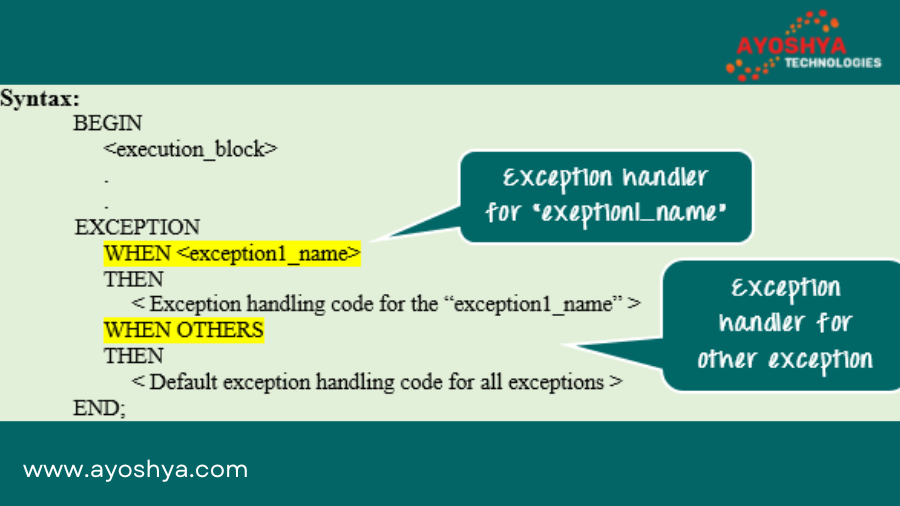which of the following is not a valid oracle pl sql exception

which of the following is not a valid oracle pl sql exception ? “Explore Oracle PL/SQL exceptions with our comprehensive guide. Learn about predefined exceptions, user-defined exceptions, and best practices for handling errors in your PL/SQL code. Enhance your Oracle database programming skills today.”
Invalid Oracle PL/SQL Exception
Out of the following common Oracle PL/SQL exceptions, one is not a valid exception:
- NO_DATA_FOUND: This exception is raised when a data retrieval operation (e.g., SELECT INTO) encounters no rows.
- INVALID_NUMBER: This exception occurs when a conversion to a number fails due to an invalid format (e.g., attempting to convert a string like “abc” to a number).
- VALUE_ERROR: This exception is raised when a data manipulation operation encounters an invalid value that violates constraints or data types.
- CURSOR_ALREADY_OPEN: This exception indicates that a cursor is already opened and attempting to open it again without closing it first.
- INVALID_IDENTIFIER (Not a valid exception in PL/SQL): This is not a predefined PL/SQL exception. It’s more likely an Oracle error that might be raised during statement execution if an unknown column name is encountered.
Understanding Exceptions in PL/SQL
- Exceptions are mechanisms in PL/SQL to handle errors or unexpected conditions gracefully.
- They allow you to write more robust and maintainable code by preventing program crashes or unexpected behavior.
- You can define exception handlers (
WHENclauses) withinBEGIN...EXCEPTION...ENDblocks to capture specific exceptions and take appropriate actions.
TConquering Errors Like a PL/SQL Pro: A Crash Course on Exceptions
Have you ever encountered cryptic error messages in your PL/SQL code, leaving you scratching your head? Worry not, for exceptions are here to rescue you! In this blog post, we’ll delve into the world of PL/SQL exceptions, empowering you to handle errors with finesse.
FAQ
Q: What exactly are exceptions in PL/SQL?
A: Exceptions are like safety nets in your code. They intercept errors and unexpected situations, preventing your program from crashing or behaving erratically.
Q: How do I use exceptions in my PL/SQL code?
A: You can utilize the BEGIN...EXCEPTION...END block structure. Within the EXCEPTION block, define WHEN clauses to specify which exceptions you want to handle. For each WHEN clause, provide the appropriate action to take when that particular exception is raised.
Example:
SQL
BEGIN
-- Code that might raise exceptions
INSERT INTO employees (employee_id, name) VALUES (123, 'John Doe');
EXCEPTION
WHEN NO_DATA_FOUND THEN
DBMS_OUTPUT.PUT_LINE('No employee found with ID 123.');
WHEN VALUE_ERROR THEN
DBMS_OUTPUT.PUT_LINE('Invalid data provided for employee insertion.');
WHEN OTHERS THEN
DBMS_OUTPUT.PUT_LINE('An unexpected error occurred.');
END;
/
Q: Are there different types of exceptions in PL/SQL?
A: Yes! Oracle PL/SQL provides a set of predefined exceptions that cover common error scenarios. You can also create your own custom exceptions for specific needs.
Q: What are some benefits of using exceptions?
A: The benefits are numerous:
- Improved Code Robustness: Exceptions prevent errors from cascading and causing program crashes.
- Enhanced Maintainability: Code becomes easier to understand and maintain by clearly separating normal execution flow from error handling.
- Error Reporting: Exceptions provide informative messages, making troubleshooting a breeze.
Conclusion:
By mastering exception handling in PL/SQL, you’ll elevate your code to a new level of professionalism and resilience. Remember, exceptions are your allies in the battle against errors, so embrace them to write robust and reliable PL/SQL applications!
you may be interested in this blog here:-
लाइटनिंग वेब कंपोनेंट्स (LWC) में कॉम्बोबॉक्स की खोज


